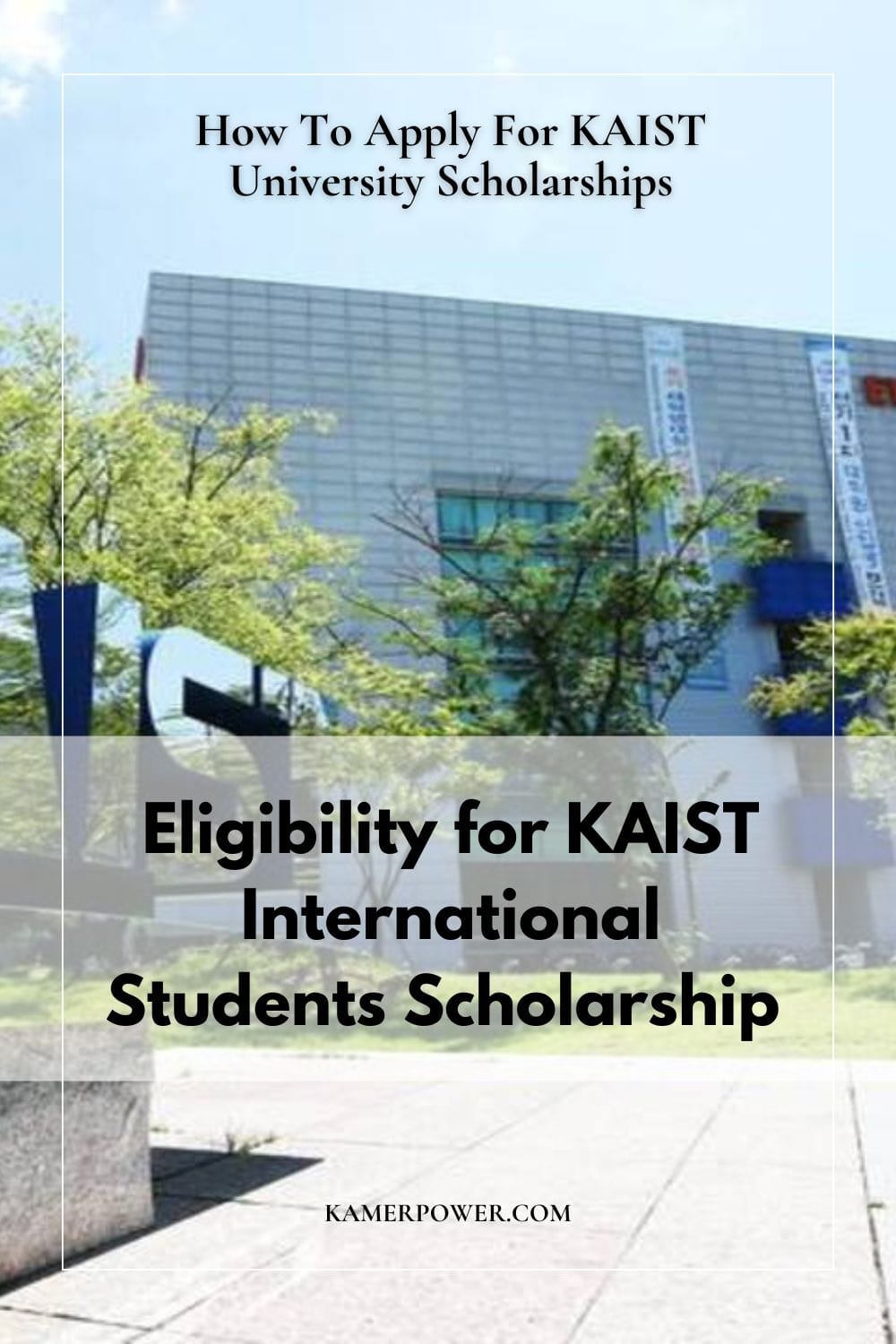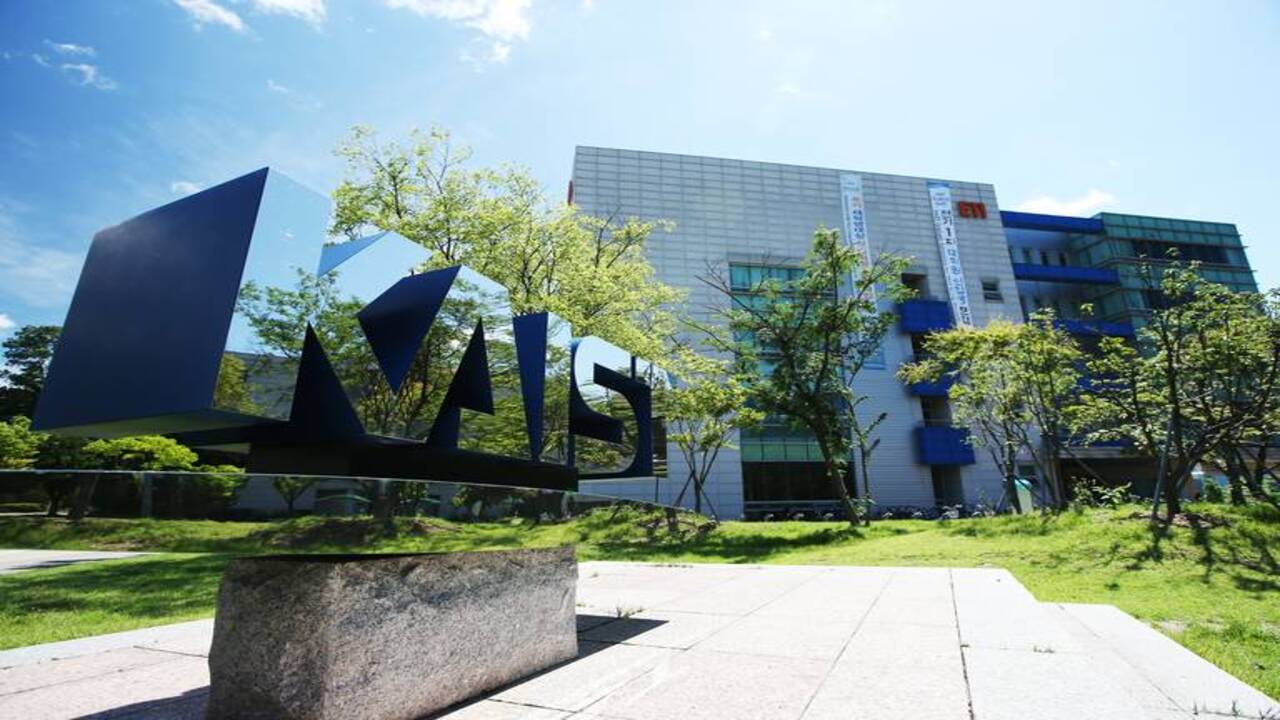KAIST University Scholarships 2026-2027 | How To Apply For KAIST Scholarship
How To Apply For KAIST Scholarship? The KAIST University Scholarships 2026-2027 is fully funded and provides full tuition fee waiver, living expenses, a monthly allowance up to 400,000 KRW and National Health insurance. This article will give you more details on how you can apply for this Scholarships. The Korean Advanced Institute of Science and Technology is a national research university located in Daedeok Innopolis, Daejeon, South Korea. KAIST is the nation’s first research-oriented science and engineering institution.
KAIST is a Famous Leading University in Asia and known by MIT of Asia. The Korean Advanced Institute of Science and Technology provides the KAIST International Students Scholarship for International Students willing to conduct the first cycle (undergraduate) studies at the institute in South Korea. Applicants who hold Korean Citizenship (dual citizenship) are NOT eligible to apply as international students.
Contents
Deadline:
- Fall Semester (Early): December – January
- Fall Semester (Regular): March – April
- Spring Semester: August- September.
- Duration: 8 semesters.
Scholarship Benefits
KAIST University Scholarship provides the recipient with the following benefits:
- A Full Scholarship (All expenses are covered by the program).
- A Monthly Allowance of 400,000 KRW for Doctoral Degree.
- Full Tuition Fee Covered.
- Medical Health Insurance fees are supported by the recipient’s advisor/department.
- A Monthly Allowance of 350,000 KRW for Master’s Course.
Eligibility for KAIST International Students Scholarship
Candidate must fulfill all of the following requirements below to qualify for KAIST University Scholarship:

- In KAIST University, English is the medium language of instruction. Therefore, applicants do not need to have Korean language skills for admission.
- Students must maintain a GPA over 2.7 out of 4.3 at KAIST after their freshman year.
- Applicants with foreign citizenship:
- Applicants who hold Korean Citizenship(dual citizenship) are not eligible to apply as foreign students.
- For applicants of Korean Origin, he/she must have received his/her entire elementary, junior high, and high school education outside of Korea at a comparable and equivalent level to that provided in Korea.
- International applicants must additionally satisfy one of the following two requirements: Neither of the applicant’s parents is a Korean citizen.
- Fall Semester : Candidates who have graduated or will graduate from their high school by the end of August.
- Spring Semester (EARLY) : Candidates who have graduated or will graduate from their high school by the end of February.
- For doctoral scholarship, applicants hold or expect to hold a bachelor’s and master’s degree before enrollment at KAIST
- For masters scholarship, applicants hold or or expect to hold a bachelor’s degree before enrollment at KAIST.
- Required Language: Applicants must meet one of the English proficiency test minimum score requirements:
- TOEFL iBT 83 (PBT 560, CBT 220).
- KAIST’s institution code for TOEFL is 0195.
- IELTS 6.5 band(Academic mode)
- TOEIC 720(Listening & Reading).
- TEPS 599/New TEPS 326.
- Required documents:
- High School Profile.
- One recommendation letter
- Standardized Official Test Score Report.
- Passport or National ID Copy.
- Statement of Financial Resources
- High school / University Transcript.
- English Proficiency Test Report
- Honors and Awards (Optional).
Types of KAIST University Scholarships (Fully funded)
Presidential Science Scholarship
- Admission fee, full amount of school support fees.
- At least 12 credits, at least 3.13/4.3 GPA.
- Study grant and living expenses are provided separately.
National Excellence Scholarship (Natural Sciences and Engineering)
- Admission fee, full amount of school support fees
- At least 12 credits, at least 3.13/4.3 GPA.
- Study grant and living expenses are provided separately.
| Type of Scholarship | Breakdown of Support (Semester) | Funding | Grade Requirements of Previous Semester | Notes | |
|---|---|---|---|---|---|
| Presidential Science Scholarship | Admission fee, full amount of school support fees | Government | At least 12 credits, at least 3.13/4.3 | Study grant and living expenses are provided separately | |
| National Excellence Scholarship (Natural Sciences and Engineering) | Admission fee, full amount of school support fees | Government | At least 12 credits, at least 3.13/4.3 | Study grant and living expenses are provided separately | |
| National Scholarship (Type 1) | Recipient of the Basic Living Security,Tier 1 | Admission fee, full amount of school support fees | Government | At least 12 credits, at least 2.50/4.3 | Standard amount of support: 2,250,000 KRW per semester |
| Tier 2 | 60% of the standard amount | Government | At least 12 credits, at least 2.50/4.3 | Standard amount of support: 2,250,000 KRW per semester | |
| Tier 3 | 40% of the standard amount | Government | At least 12 credits, at least 2.50/4.3 | Standard amount of support: 2,250,000 KRW per semester | |
| Tier 4 | 30% of the standard amount/td> | Government | At least 12 credits, at least 2.50/4.3 | Standard amount of support: 2,250,000 KRW per semester | |
| Tier 5 | 25% of the standard amount | Government | At least 12 credits, at least 2.50/4.3 | Standard amount of support: 2,250,000 KRW per semester | |
| Tier 6 | 20% of the standard amount | Government | At least 12 credits, at least 2.50/4.3 | Standard amount of support: 2,250,000 KRW per semester | |
| Tier 7, Tier 8 | 15% of the standard amount | Government | At least 12 credits, at least 2.50/4.3 | Standard amount of support: 2,250,000 KRW per semester | |
| Low Income Family Scholarship (no more than 3 allotments) | Difference of school support fees | University | At least 12 credits, at least 2.50/4.3 | National Scholarship (type 1) income, successful candidates of the grade requirements | |
| Low Income Family Scholarship (no more than 3 allotments) | Full amount of school support fees | University | At least 2.00/4.3 | National Scholarship (type 1), unsuccessful candidates of the grade requirements | |
| Low Income Family Scholarship (no more than 3 allotments) | Tuition + full amount of school support fees | University | Less than 2.00/4.3 | National Scholarship (type 1), unsuccessful candidates of the grade requirements | |
| Financial Aid Scholarship | Full amount of school support fees | University | At least 12 credits, at least 3.00/4.3 | National Scholarship (type 1) income, successful candidates of the grade requirements receive the difference of the school support fees. | |
| External Scholarships | Sum determined by the foundation. | External | Standard determined by the foundation. | ||
Financial Aid Types
| Type of Scholarship. | Scholarship Amount | Funding | Eligibility and Standards | Notes |
|---|---|---|---|---|
| Undergraduate Financial Aid | 135,000 KRW/month | University | All enrolled students, within the enrollment duration limit (8 semesters), provide 4 months per semester | |
| Master’s Financial Aid | 265,000 KRW/month | University | All national scholarship students, within the enrollment duration limit (4 semesters), provide 6 months per semester |
How To Apply For KAIST Scholarship?

- Fill in the KAIST application form online with your required information and upload your documents.
- The applicant must pay the application fee is USD 80 or KRW 80,000. Payment can be made by credit card or bank transfer after writing application form online. Additional charges (i.e. bank charges) should be covered by the applicants. Please note that application fee is non-refundable and you cannot modify application form once you pay the fee.
- Once the application fee is paid, an e-mail with instructions on how to submit recommendations will be automatically sent to the recommenders. Therefore, in order to allow recommenders sufficient time to prepare and upload their recommendations, applicants are advised to pay the application fee on time.
- Lastly, submit your application.
Courses Offered for KAIST Scholarships
College of Engineering
- Computer Science.
- Civil & Environmental Engineering.
- Bio & Brain Engineering.
- Materials Science & Engineering
- Nuclear & Quantum Engineering.
- Industrial Design.
- Mechanical Engineering
- Aerospace Engineering
- Electrical Engineering.
- Industrial & Systems Engineering
- Chemical & Biomolecular Engineering.
College of Business
- Business and Technology Management.
College of Life Science & Bioengineering
- Biological Sciences.
College of Natural Sciences.
- Chemistry.
- Physics.
- Mathematical Sciences.
Recommendation